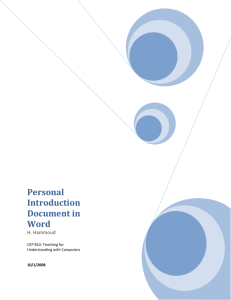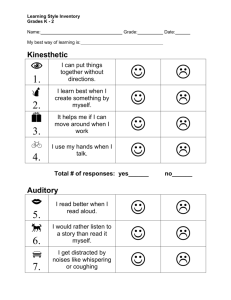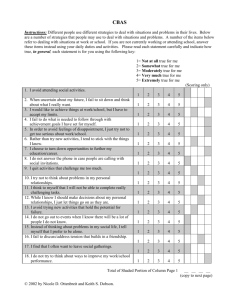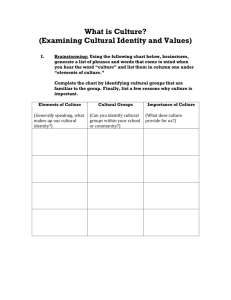The four fundamental conditions for fulfilled existence
advertisement
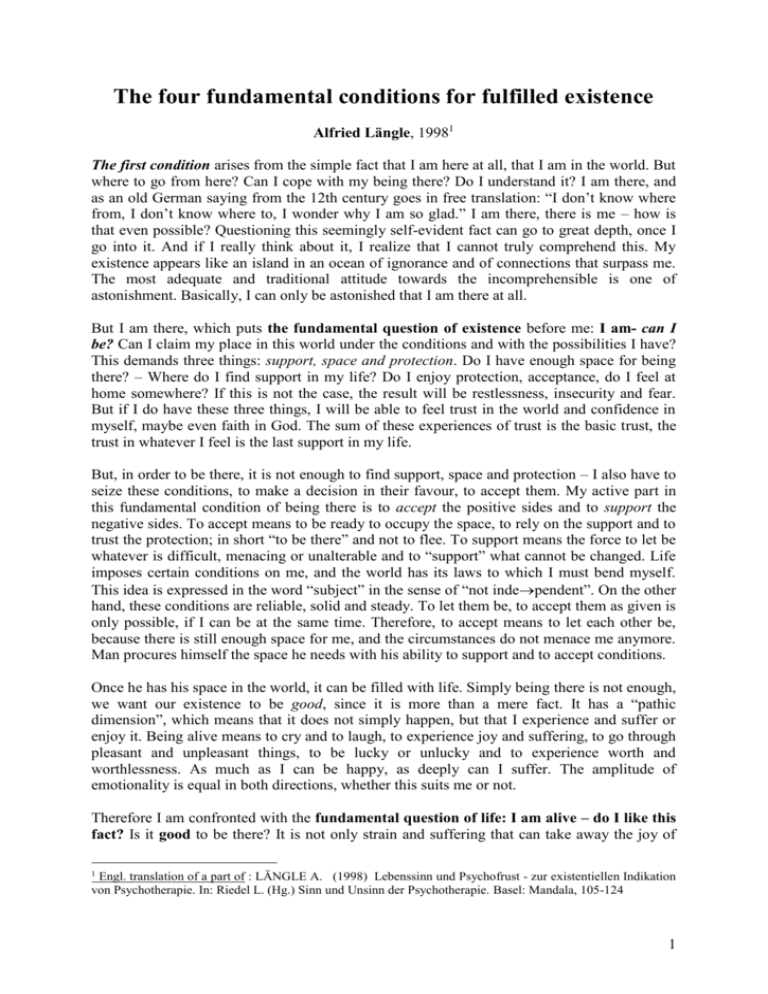
The four fundamental conditions for fulfilled existence Alfried Längle, 19981 The first condition arises from the simple fact that I am here at all, that I am in the world. But where to go from here? Can I cope with my being there? Do I understand it? I am there, and as an old German saying from the 12th century goes in free translation: “I don’t know where from, I don’t know where to, I wonder why I am so glad.” I am there, there is me – how is that even possible? Questioning this seemingly self-evident fact can go to great depth, once I go into it. And if I really think about it, I realize that I cannot truly comprehend this. My existence appears like an island in an ocean of ignorance and of connections that surpass me. The most adequate and traditional attitude towards the incomprehensible is one of astonishment. Basically, I can only be astonished that I am there at all. But I am there, which puts the fundamental question of existence before me: I am- can I be? Can I claim my place in this world under the conditions and with the possibilities I have? This demands three things: support, space and protection. Do I have enough space for being there? – Where do I find support in my life? Do I enjoy protection, acceptance, do I feel at home somewhere? If this is not the case, the result will be restlessness, insecurity and fear. But if I do have these three things, I will be able to feel trust in the world and confidence in myself, maybe even faith in God. The sum of these experiences of trust is the basic trust, the trust in whatever I feel is the last support in my life. But, in order to be there, it is not enough to find support, space and protection – I also have to seize these conditions, to make a decision in their favour, to accept them. My active part in this fundamental condition of being there is to accept the positive sides and to support the negative sides. To accept means to be ready to occupy the space, to rely on the support and to trust the protection; in short “to be there” and not to flee. To support means the force to let be whatever is difficult, menacing or unalterable and to “support” what cannot be changed. Life imposes certain conditions on me, and the world has its laws to which I must bend myself. This idea is expressed in the word “subject” in the sense of “not independent”. On the other hand, these conditions are reliable, solid and steady. To let them be, to accept them as given is only possible, if I can be at the same time. Therefore, to accept means to let each other be, because there is still enough space for me, and the circumstances do not menace me anymore. Man procures himself the space he needs with his ability to support and to accept conditions. Once he has his space in the world, it can be filled with life. Simply being there is not enough, we want our existence to be good, since it is more than a mere fact. It has a “pathic dimension”, which means that it does not simply happen, but that I experience and suffer or enjoy it. Being alive means to cry and to laugh, to experience joy and suffering, to go through pleasant and unpleasant things, to be lucky or unlucky and to experience worth and worthlessness. As much as I can be happy, as deeply can I suffer. The amplitude of emotionality is equal in both directions, whether this suits me or not. Therefore I am confronted with the fundamental question of life: I am alive – do I like this fact? Is it good to be there? It is not only strain and suffering that can take away the joy of 1 Engl. translation of a part of : LÄNGLE A. (1998) Lebenssinn und Psychofrust - zur existentiellen Indikation von Psychotherapie. In: Riedel L. (Hg.) Sinn und Unsinn der Psychotherapie. Basel: Mandala, 105-124 1 life. I may as well be the shallowness of daily life and the negligence in one’s life style that make life stale. In order to seize my life, to love it, I need three things: closeness, time and relationship. Can I feel close and maintain closeness to things, plants, animals and people? Can I admit the closeness of someone else? – What do I take time for? To take time for something means to give a part of one’s life, to spend part of my life with someone or something. – Do I have relationships, in which I feel closeness, for which I spend time and in which I experience community? If closeness, time and relationships are lacking, longing will arise, then coldness and finally depression. But if these three conditions are fulfilled, I experience myself as being in harmony with the world and with myself and I can sense the depth of life. These experiences form the fundamental value, the most profound feeling for the value of life. In each experience this fundamental value is touched upon, it colours the emotions and affects and represents our yardstick for anything we might feel to be of worth. Still, it is not enough to have closeness, time and relationships. My own consent, my active participation are asked for. I seize life, engage in it, when I turn to other people, to things, animals, intellectual work or to myself, when I go towards it, get close, into touch or pull it towards me. This will make life vibrate within me. If life is to make me move freely, my consent to being touched is necessary. As pleasant as this emotional swinging may be, it is not sufficient for a fulfilling existence. In spite of my being related to life and to people, I am aware of my being separate, different. There is a singularity that makes me an “I” and distinguishes me from everybody else. I realize that I am on my own, that I have to master my existence myself and that, basically, I am alone and may even be solitary. But, besides, there is so much more that is equally singular. The diversity, beauty and uniqueness in all of this make me feel respect. In the midst of this world, I discover myself unmistakably, I am with myself and I am given to myself. This puts before me the fundamental question of being a person – may I be like this? Do I have the right to be what I am and to behave as I do? – This is the plane of identity, of knowing oneself and of ethics. In order to succeed here, it is necessary to have experienced three things: considerateness, respect and justification. – By whom am I seen, considered and respected? For what am I appreciated – for what can I appreciate myself? – If these experiences are missing, solitude will be the result, hysteria as well as a need to hide behind the shame. If, on the contrary, these experiences have been made, I will find myself, find my authenticity, my relief and my self-respect. The sum of these experiences builds one’s own worth, the profoundest worth of what identifies my own self at its core. In order to be able to be oneself, it is not enough to experience consideration, appreciation and approval. I also have to say “yes to myself”. This requires my active participation: to look at other people, to encounter them and, at the same time, to delimitate myself and to stand by my own. Delimitation and encounter are the two means by which we can live our authenticity without ending up in solitude. Encounter represents the necessary bridge, makes me find my own “I” in the “you”.Thus I create for myself the appreciation requisite for feeling entitled to be what I am. If I can be there, love life and find myself therein, the conditions are fulfilled for the fourth fundamental condition of existence: the recognition of what my life is all about. It does not suffice to simply be there and to have found oneself. In a sense, we have to transcend ourselves, of we want to find fulfillment and to be fruitful. Otherwise we would live as if in a house where nobody ever visits. 2 Thus the transience of life puts before us the question of the meaning of our existence: I am there – for what good? For this three things are needed: a field of acitivity, a structural context and a value to be realized in the future. – Is there a place where I feel needed, where I can be productive? – Do I see and experience myself in a larger context that provides structure and orientation to my life? – Is there anything that should still be realized in my life? If this is not the case, the result will be a feeling of emptiness, frustration, even despair and frequently addiction. If, on the contrary, these conditions are met, I will be capable of dedication and action and, finally, of my own form of religious belief. The sum of these experiences add up to the meaning of life and lead to a sense of fulfillment. But it does not suffice to have a field of activity, to have one’s place within a context and to know of values to be realized in the future. Instead, a phenomenological attitude is needed, which represents the existential access to life: an attitude of openness that is concerned with the questions put before me in specific situations (Frankl 1987). “What does this hour want from me, how shall I respond?” The important thing is not only what I can expect from life, but, in accordance with the dialogical structure of existence, it is equally important what life wants from me and what the moment is expecting from me and what I could and should do now for others as well as for myself. My active part in this attitude of openness is to bring myself into agreement with the situation, to examine whether what I am doing is really a good thing: for the others, for myself, for the future, for my environment. If I act accordingly, my existence will be fulfilled. Viktor Frankl (1987) defined meaning as “a possibility against the background of reality.” I would put it a little differently as “the most valuable possibility of the given situation”. Existential meaning is therefore that what is possible here and now, on the basis of facts and reality, what is possible for me, what I need now, what is now the most pressing, valuable or interesting. To define an redefine this continually is an extremely complex task for which we possess an inner organ of perception capable of reducing this complexity to livable proportions. Besides this existential meaning there is an ontological meaning. This is the overall meaning in which I find myself and which does not depend on me. It is the philosophical and religious meaning, that of the creator. I can perceive it in devination and in faith. (Cf. Längle 1994b for the differentiation between the two forms of meaning.) There is a story that Frankl used to tell and that illustrates in a simple way the importance of the ontological meaning for understanding life. (cf. Längle 1994a, 66ff) With this story I intend to end my presentation. It was at the time when the cathedral at Chartres was being built. A traveller came along the way and saw a man sitting at the roadside, cutting a stone. The traveller asked him astonished what he was doing there. “Don’t you see? I am cutting stones!” Nonplussed the traveller continued on his way. Around the next bend, he saw another man, also cutting stones. Again he stopped and asked the same question. “I am cutting corner-stones,” was the reply. Shaking his head, our man travelled on. After a while he met a third man who was sitting in the dust and cutting stones, just as the others had been. Resolutely he walked up to him and asked: “Are you also cutting corner-stones?” – The man looked up at him, wiped the sweat from his brow and said:” I am building a cathedral.” 3


